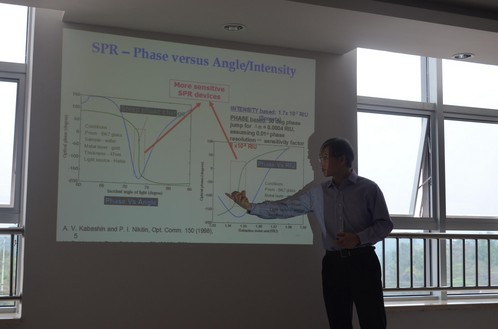September 29, 2013, Professor He Haopei came from the Department of Electronic Engineering of the Chinese University of Hong Kong visited our institute and gave us a report named Surface Plasmon Resonance Photonic Biosensors. The report was chaired by Researcher Wang Zhongxun who is a dean assistant and the chief of technology department . Reseacher Du Chunlei, director of intelligent institute, also took part in the report. In the report, Professor He introduced the basic concepts of surface plasma wave. The report focused on series of the research results that Professor He led his team had got basing on the phase detection method to improve surface plasma wave high sensitivity refractive index detection, the report also prospected the application of the technique and Professor He had a warm interraction with the reportors attending the report. He Haopei, a professor of the Department of Electronic Engineering of the Chinese University of HongKong, chairman of Hongkong Society for optical engineering, committee of Hong Kong LED Lighting Project Advisory Committee, fellow of the American Institute of Electrical and Electronics Engineers and fellow of the Hong Kong Institution of Engineers.Professor He published more than 230 academic papers in famous journals or international conferences as corresponding author or first author and published three books, he has five authorized or open patents in US, six Chinese invention patents, and he promoted the the industrialization of research results. Professor He Haopei’s main research interests include surface plasmon biosensing, optical manipulation of nanoparticles, surface-enhanced Raman scattering, research of light-activated synthesis of nanomaterials and sensor technology based on microfluidics. Phase technique he invented makes biological sensors that detect viruses and food cost less and sensitivity increased threefold. 
|

